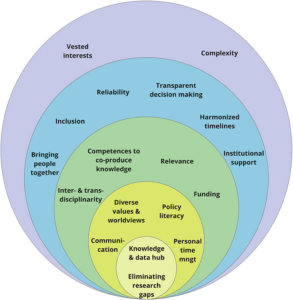The Science Service aims to ratchet up the EU Biodiversity Strategy 2030 by linking scientific and non-scientific knowledge more efficiently with policymaking and implementation. Functioning as a hub for science-policy-society interactions, the Science Service could play a crucial role in enhancing the implementation of biodiversity policies. However, existing research underscores a variety of challenges in this process, necessitating focused efforts on capacity development for key stakeholders. Our freshly published report, employing a diverse methodology of expert interviews, surveys, workshops and desk research, thoroughly examines capacity needs in science-policy-society interfaces (SPSIs) and potential ways the BioAgora project and the forthcoming Science Service could enhance these capacities.
Throughout the research process, we asked four main types of actors – scientists, policymakers, civil society actors, and businesses – about the challenges they encounter when trying to engage in SPSIs. Drawing from these exchanges, we identified eighteen major capacity development needs. Most of these have been reported in the literature before and have already been addressed to different degrees by existing capacity development efforts. Hence, the persistence of these needs suggests that there is a mismatch between the demand and supply side of capacity development initiatives, highlighting the importance of creating better targeted and less fragmented initiatives.

Figure: A systematic framework of emerging capacity development needs
Persistent challenges include communication gaps, policy literacy deficiencies, and constraints in resource and time availability. However, the analysis of stakeholder interviews highlights disparate capacity needs across various thematic fields, underlining the urgency and variations in emphasis. The report also explores the widespread presence of stereotypes among stakeholders, pointing out the barriers these biases pose to fostering collaborative SPSIs. It also underscores the importance of inclusion, urging stakeholders to step out of their comfort zones for more effective engagement with diverse actors.
The recommendations of the report emphasise a strategic approach, advocating for the prioritisation of specific needs, targeted initiatives, and coordination with existing programs. Proposals extend to the development of specific capacity development activities, encompassing:
- the improvement of science-policy-society interaction skills and competences,
- topical capacity development to enhance the implementation of biodiversity conservation goals by forging collaborations with existing training centres,
- as well as the training of new boundary spanners.
The report concludes with a call for continual internal collaboration and iterative learning through SPSIs, and nuanced evaluations to optimise capacity development and support the resilience of biodiversity conservation strategies.
In conclusion, the journey towards biodiversity conservation demands a concerted effort to address capacity development needs. By building on the insights and recommendations outlined in this report, we can navigate the complexities of the SPSI landscape, ensuring a brighter future for our planet’s rich biodiversity.
